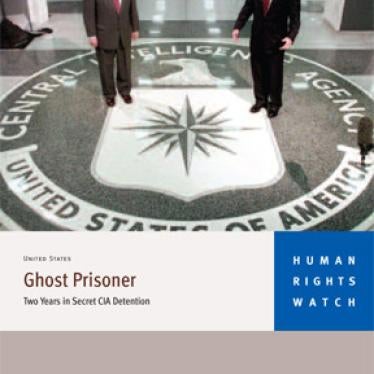(Washington, DC) - President George W. Bush should not issue a preemptive pardon of past or present officials implicated in torture or other abuses related to the "war on terror," said Human Rights Watch and eight other organizations in a letter sent to the president today.
Although the US Constitution gives the president the power to pardon federal crimes, a broad pardon covering torture and other serious crimes would be an unprecedented misuse of the pardon power.
"The Bush administration's approval of abusive interrogation techniques, renditions to torture, and CIA-run black sites has already significantly damaged America's reputation around the world," said Jennifer Daskal, senior counterterrorism counsel at Human Rights Watch. "President Bush should not make matters worse by foreclosing criminal investigations before they begin."
After September 11, 2001, the Bush administration approved the use of what it called "enhanced interrogation techniques" - including "waterboarding," exposure to extreme cold, and sleep deprivation - for use against persons detained in the "global war on terror." More than 100 detainees were "disappeared" into CIA-run prisons, and dozens rendered to countries such as Jordan and Syria where they were subject to torture and other abuses.
Investigations into these and other abuse of detainees have been fragmentary and limited. The actions of administration officials - including the president himself - have not been credibly examined. By issuing a preemptive pardon, President Bush would effectively block critical Department of Justice investigations before they have even begun, and deprive the public of an important investigatory tool to know what was done in its name.
Broad "preemptive pardons" or amnesties have been issued in the past, but issuing pardons for detainee abuse would differ fundamentally from previous amnesties.
Abraham Lincoln and Andrew Johnson pardoned Confederate soldiers as a step toward the unity and reconstruction of the nation after the Civil War. Jimmy Carter pardoned Vietnam War draft resisters in an attempt to unify the nation after a divisive conflict. Neither of these broad preemptive pardons was for members of the president's own administration.
"President Bush would be the first president to pardon himself, something even Richard Nixon did not do," Daskal said. "Issuing pardons for abuses in the ‘war on terror' would be viewed around the world as an admission of guilt."
Pardons for serious abuses related to US counterterrorism efforts would also violate the United States' obligations under international law. Treaties ratified by the United States, including the 1949 Geneva Conventions and the Convention against Torture and Other Cruel, Inhuman or Degrading Treatment or Punishment, require that all states investigate and, if appropriate, prosecute those responsible for serious international crimes such as torture. A pardon would put the US at odds with global trends toward greater accountability and interfere with necessary efforts of the new administration to reclaim its position as an international advocate for human rights. It would also increase the likelihood that foreign nations would try to fill the gap in accountability by initiating legal proceedings abroad against administration officials.
The organizations signing the letter include the American Civil Liberties Union, Amnesty International, Center for Victims of Torture, Evangelicals for Human Rights, Human Rights First, Human Rights Watch, International Center for Transitional Justice, Open Society Policy Center, and Physicians for Human Rights.







